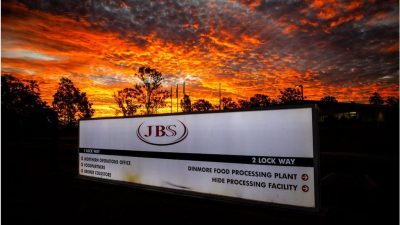The breach is the latest targeting of a crucial supply chain and comes three weeks after the Colonial Pipeline hack disrupted fuel operations in the U.S.
Here’s what we know:
What is JBS?
JBS USA is part of JBS Foods, one of the world’s largest food companies. It has operations in 15 countries and has customers in about 100 countries, according to its website. Its customers include supermarkets and fast food outlet McDonald’s and in the US, JBS processes nearly one quarter of the county’s beef and one-fifth of its pork. JBS’s five biggest beef plants are in the US, and the shutdowns have halted a fifth of meat production there, according to Bloomberg.
Its brands include Pilgrim’s, Great Southern and Aberdeen Black. The US headquarters is based in Greeley, Colorado, and it employs more than 66,000 people.
What happened?
Hackers attacked the company’s IT system last weekend, prompting shutdowns at company plants in North America and Australia. IT systems are essential in modern meat processing plants, with computers used at multiple stages including billing and shipping.
JBS hack shuttered nine US beef plants but normal operations to resume Wednesday
The hack, which the White House described Tuesday as ransomware, affected all of JBS’s US meatpacking facilities, according to an official at the United Food and Commercial Workers union that represents JBS employees. The cyberattack resulted in the closure of all nine of the company’s US beef plants, which are located in states including Arizona, Texas, Nebraska, Colorado, Wisconsin, Utah, Michigan and Pennsylvania, the union official said. The company said on Monday that it suspended all affected IT systems as soon as the attack was detected, and that its backup servers were not hacked.
The White House has said that the ransomware attack was likely carried out by a Russia-based criminal organization, and that it is dealing with the Russian government on the matter.
JBS’ operations in Australia were also affected. The Australian Meat Industry Council, a major trade group, said in a statement that “there is no indication whatsoever that this cyberattack will cause a major impact on Australian domestic red meat and pork products supply.”
What is ransomware?
In a ransomware attack, hackers steal an organization’s data and lock its computers. Victims must pay to regain access to their network and prevent the release of sensitive information.
Some sophisticated ransomware hackers, such as the Russian hacker group Darkside, sell their ransomware technology and take a cut of any ransoms paid to their customers.
Experts generally encourage ransomware victims not to pay any ransom. But a company’s ability to get back online without paying hackers may depend on whether it has protected backups of its data. In some cases, hackers can delete their target’s backups before locking its files, leaving the victim organization with no recourse.
JBS did not comment to CNN about details of the ransomware attack, including whether it paid the ransom.
This kind of cyberattack sounds familiar. Where have I heard that?
The hack comes a few weeks after a ransomware attack targeted Colonial Pipeline, which forced a six-day shutdown of one of the United States’ largest fuel pipelines. That May attack resulted in gas shortages, spiking prices and consumer panic. Colonial Pipeline has confirmed it paid a $4.4m (£3.1m) ransom to the cyber-criminal gang responsible.
Similar to JBS, Colonial Pipeline’s systems were hit with ransomware. Once a company has been hit by ransomware, its first course of action is usually to take much or all of its systems offline to isolate the hackers’ access and make sure they can’t move into other parts of the network.
That may be among the reasons why JBS shut down its operations and Colonial shut down its pipeline — to disconnect the companies’ operations from the IT systems that hackers breached. People briefed on the Colonial attack have said that the company halted operations because its billing system was also compromised and feared they wouldn’t be able to determine how much to bill customers for fuel they received.
The pipeline has since returned to normal operations.
Don’t be the next victim of a ransomware attack. Contact South Jersey Techies to discuss how your critical information can be secure.
If you have any questions, please email us at support@sjtechies.com or call us at (856) 745-9990.


